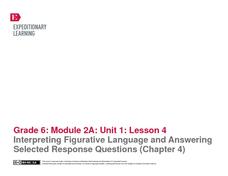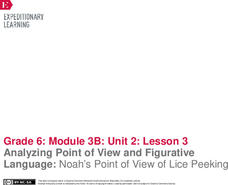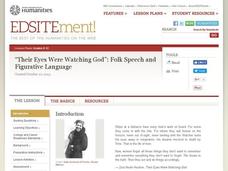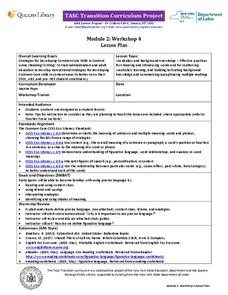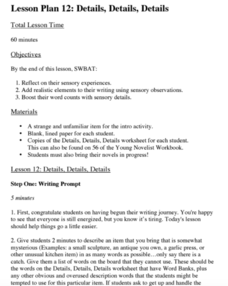Read Works
Figurative Language
Here's a richly detailed unit, designed for second graders, that focuses on decoding figurative language, including similes, metaphors, personification and idioms.
EngageNY
Interpreting Figurative Language and Answering Selected Response Questions (Chapter 4)
To prepare for an assessment of how well individuals are progressing with their ability to identify and analyze figurative language and its effect on tone and meaning, pairs work through Chapter Four of Christopher Paul Curtis'...
Teachers.net
Figurative Language
When is a staple remover a fanged monster? In your ELA classroom when you're teaching this fun figurative language lesson, of course! Get your young writers using figurative language by making a game of it. Give groups a paper bag full...
Achieve3000
Figurative Language
Similes and metaphors make writing more beautiful and detailed, but can be a little harder to decipher during a first reading. Use a passage from The Man Who Loved Words to show young readers how to think through passages that...
K20 LEARN
My Love Is Like Figurative Language: Figurative Language in Romeo and Juliet
My love is like an anaconda. Huh? Scholars investigate similes, metaphors, hyperbole, and personification used by writers to express feelings. They examine lyrics from songs and lines from Romeo and Juliet and consider how the use of...
PBS
Figurative Language and Foreshadowing in The Outsiders
S.E. Hinton's The Outsiders is still relatable to teenagers today, even though it was written more than 50 years ago. Explore how the figurative language of the story works to establish characterization, and how foreshadowing lays...
EngageNY
Analyzing Point of View and Figurative Language: Noah’s Point of View of Lice Peeking
Read along with me. Two learners read the parts of Noah and Lice in Flush as the rest of the class follows along. Readers look for unfamiliar words and the use of figurative language in the text. They complete graphic organizers and...
Curated OER
The Use of Language in "I Know Why the Caged Bird Sings"
Readers of I Know Why the Caged Bird Sings are asked to craft an essay in which they compare how Maya Angelou uses figurative language to depict herself and Mrs. Flowers.
Roald Dahl
Matilda - Miss Honey and The Trunchbull
As the instructor reads aloud several quotes from five chapters of the story Matilda, class members mime their interpretation of the scenes. Then, after reading "Miss Honey" and "The Trenchbull" (chapters seven and eight), the...
Curated OER
"Their Eyes Were Watching God": Folk Speech and Figurative Language
Using or considering using Zora Neale Hurston's Their Eyes Were Watching God? Then this packet is a must for your curriculum library. The examination of how Hurston combines folklore and folk language to create the voice of her...
EngageNY
Grade 10 ELA Module 4: Unit 2, Lesson 18
Macbeth describes life as a light and a candle, suggesting it is fleeting and meaningless. Using the resource, scholars engage in an evidence-based discussion and complete a Quick Write about Shakespeare's use of figurative language in...
Cleveland Metro School District
Novel Lesson for The Giver
Lois Lowry's The Giver is one of the most engaging and thought-provoking works of literature in the middle school curriculum. Round out your novel unit with a collection of reading activities, comprehension questions, memoir and...
EngageNY
Grade 11 ELA Module 2: Unit 1, Lesson 22
Say precisely what you mean. Scholars analyze the importance of Washington's precise language in paragraphs eight and nine of the "Atlanta Compromise" speech. They interpret his figurative language and add it to their Idea Tracking...
August House
Anansi and the Pot of Beans
Anansi is a tricky character, but can he realize he's wrong and write an apology letter? Learners use Anansi and the Pot of Beans to practice writing, art, and figurative language. A series of activities are engaging for both...
EngageNY
Grade 10 ELA Module 4: Unit 2, Lesson 13
Lady Macduff uses a metaphor to suggest that her husband does not possess the courage of even a tiny, short-winged bird—ouch! Using the resource, pupils discover Act 4.2 of Shakespeare's Macbeth. Using reading, writing, and discussion,...
EngageNY
Grade 11 ELA Module 2: Unit 2, Lesson 5
Elizabeth Cady Stanton compares sins to monsters, using a metaphor to make a point about morality. Using the fifth of 14 lessons from the Grade 11 ELA Module 2: Unit 2 series, learners analyze paragraphs 8-10 of "An Address by Elizabeth...
EngageNY
Contrasting Two Settings (Chapter 6: "Lost Melones/Cantalouples")
Continue working through Esperanza Rising, by Pam Munoz Ryan, by looking into language choices and discussing text-dependent questions. Pupils converse in small groups and as a class about plot, setting, and figurative language. Using...
K20 LEARN
Brushstrokes: Communication/Using Descriptive Language
Sometimes a picture reflects a thousand descriptive words. To illustrate the importance of sensory words in descriptive writing, scholars listen to a song and craft a painting in response. After sharing their work with the class,...
EngageNY
Grade 11 ELA Module 2: Unit 2, Lesson 10
Audre Lorde's poem "From the House of Yemanjá" describes the speaker carrying two women on her back—she must be strong! Pupils read the second stanza using instructional activity 10 of 14 from the Grade 11 ELA Module 2: Unit 2 series....
EngageNY
Grade 10 ELA Module 1: Unit 1, Lesson 7
Can three works of literature work together to establish and develop a common central idea? Put your thoughts into writing with a final assessment focused on a unit-long analysis of Christopher Marlowe's "The Passionate Shepard to His...
Curated OER
Magical Musical Tour: Using Music Lyrics to Teach Literary Elements
While music lyrics are often used to teach literary elements, the richness of this resource comes from the wealth of exercises, activities, and support materials provided in the packet. Although designed for gifted learners, the...
Curated OER
Reading Poetry in the Middle Grades
Bring the beauty of "Nothing Gold Can Stay" by Robert Frost to middle school language arts. After learners read a copy of the poem, they follow an instructional sequence that focuses on sound, figurative language, and theme.
New York State Education Department
TASC Transition Curriculum: Workshop 4
Why is it important to use precise language? Participants explore this question in the fourth activity in a series of 15 on effective instruction. Perfect for all content areas, the activity promotes appropriate language choice through...
Curated OER
Details, Details, Details
Writing can become one-dimensional if authors don't involve all their senses. First, scholars observe a strange object which, ideally, they can touch and even smell. Without using certain words (you can create a list or have the class...

